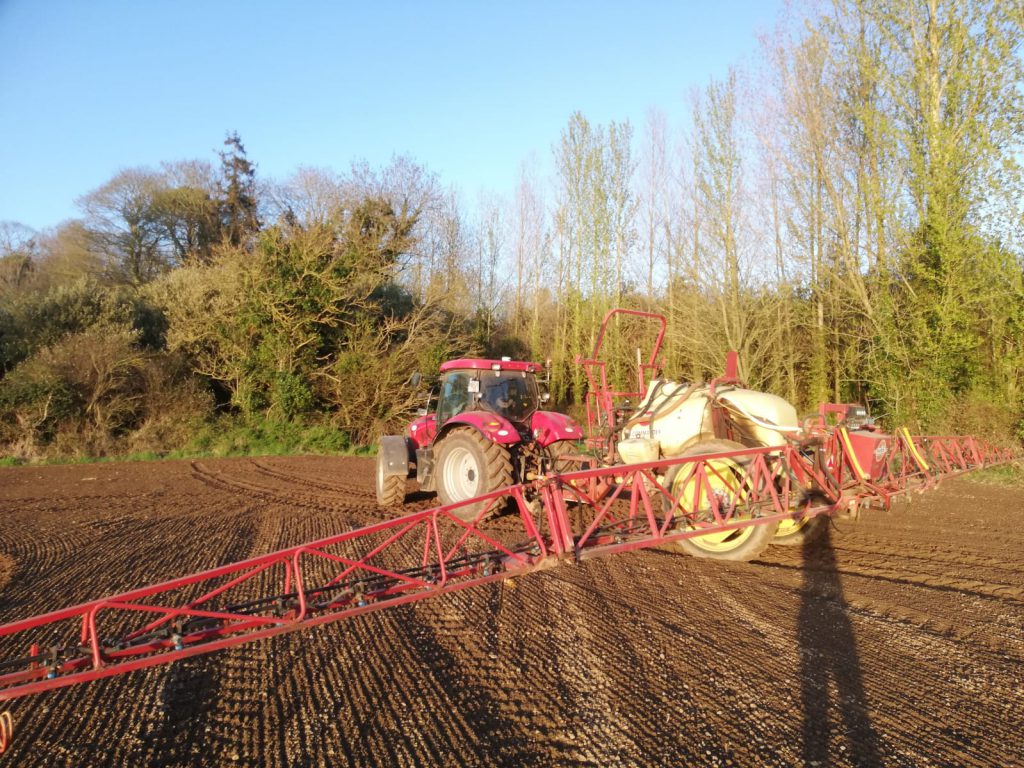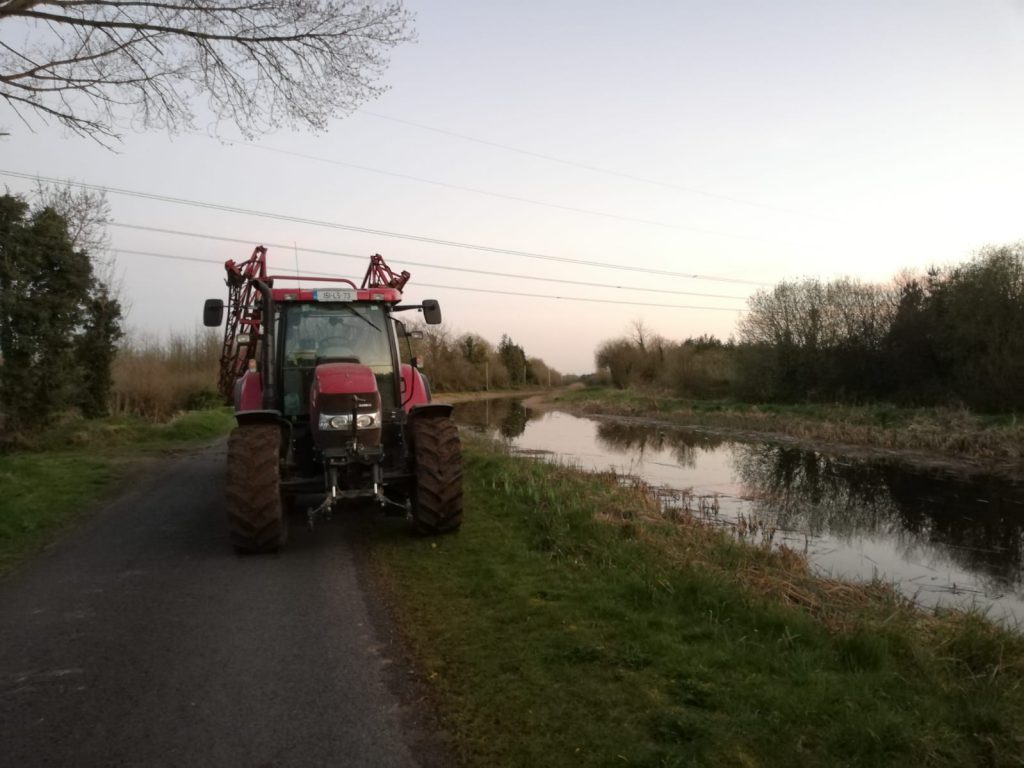In this week’s Tillage Focus, AgriLand caught with Bobby Miller (over the phone). The Co. Laois man has been busy sowing spring crops on his own farm since the beginning of April; he captured some timely images of progress…along the way.
“I didn’t get in as many winter crops as I wanted and there were no ploughing opportunities during the winter to ease the burden of the workload when the weather did come fine, so it’s been all go in the past two to three weeks – day and night. I took the odd short break to recharge the batteries.”
Bobby completed his ploughing before beginning to sow to allow land to dry out, with the exception of his spring beans, which he planted on March 28.
Those Lynx beans receive a pre-emergence herbicide of Stallion on Monday evening (April 6) when the soil was still damp following Sunday’s rain.

Bobby sprayed a pre-emergence herbicide on his spring beans during the week. Image source: Bobby Miller
This year Bobby increased the area of oats which he plants. Glanbia has increased demand for gluten-free oats and, as well as planting winter oats, Bobby replaced some of his spring barley area with oats.
The spring oats – Isabel – were planted on April 1 at a rate of 9.5st/ac (150kg/ha). Bobby noted that there will be a lot of spring barley around this year and he reasoned that replacing some of that area with gluten-free oats might prove to be a better option.
He has also forward sold some of his grain and plans to sell more before harvest. His crop of beans is also planted with a guaranteed minimum price, so he is balancing his risk over the season instead of leaving all prices until harvest time.
Spring barley was planted between April 2 and April 4. Laureate was planted at 10.25st/ac (160kg/ha). He added that he left half an acre behind as it was too wet to plant, but he will return with the drill once it has dried out.
Bobby ploughs and uses a one-pass when sowing. He noted that this method suits his farm and that there are pros and cons to all methods and systems, whether it be a plough-based, direct-drill or minimum-tillage approach.
He then said: “The main message we need to get out is emissions are very low in tillage compared to other sectors.”
CAP and other schemes
“As a sector we are very low on emissions. I believe when it comes to schemes like TAMS and GLAS there should be no preference given to some practices over others, because there are pros and cons for all systems.”
He was adamant that the new CAP should not force people into one method or another or put more of an emphasis on any one establishment method.
He added that the TAMS scheme needs to be updated.
“If a dairy farmer can get a parlour, I think tillage farmers are entitled to grants for combines and other equipment like flotation tyres and lower-spec fertiliser spreaders with rate control for example, but without weigh cells and very advanced technology that may only suit a very large scale.”
He added that while it would not be that straightforward and regulations would be needed more equality does need to be brought into the scheme.
Winter barley
When AgriLand spoke to Bobby on Tuesday he was going to spread fertiliser on his winter barley. Plant growth regulator was due to be applied towards the weekend, as temperatures warm up. Herbicide had been applied in February.
I’m happy enough with my winter crops. The oats are looking exceptional and came through the winter very well. They were sown at the end of October.
Covid-19
Bobby said while out on the tractor he is self isolating all the time, but is all too aware of the realities of Covid-19 as his wife works as a nurse in A&E.
He appealed to people to stay at home and to take care when farming. For example, there’s a lot of casual labour used on farms in the spring time.
- Image source: Bobby MIller
- Image source: Bobby MIller
- Image source: Bobby MIller
He appealed to people to have hand-washing facilities, hand sanitiser, anti-bacterial wipes and gloves for all workers. He said caution is needed and tractors should be cleaned down between drivers and should not be shared where possible.
He also said people should not be going into other people’s houses for meals.
Farmers should also be organised, he noted, and order fertiliser and chemicals ahead of time…and go into merchants only to collect products.
Arable April
Bobby is chairperson of the Irish Grain Growers Group (IGGG), which is promoting Arable April in conjunction with AgriLand.
He encouraged people to take part in the initiative and send in their pictures, as the pressure of sowing eases off.
“Every acre we lose from tillage means that we’re increasing our overall emissions. I think we need to promote our sector more. Arable April is one way of doing that. I’d encourage people to highlight these facts over the coming weeks…and send in pictures.
He added that tillage needs to be brought to the fore in the next round of CAP and other agricultural schemes.
To lose the area of tillage land that we have lost over the past number of years is illogical.
“There are opportunities there, like gluten-free oats.”
He added: “It’s shocking that we have to import the majority of our flour. There needs to be more steps to protect the tillage farmer in the drinks industry too.
“We can have a very prosperous tillage sector here in Ireland, but far more needs to be done.”






